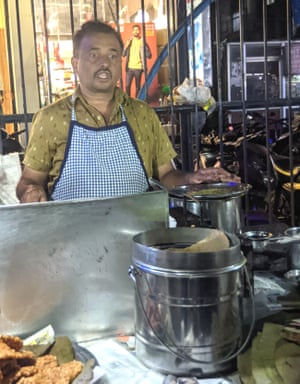Meals to go? Covid threatens Hyderabad’s well-known avenue foods carts | World wide improvement
On a normal working working day, Venkateshwara Rao would be all set by 4pm, stationed on the pavement waiting for business workers to emerge and purchase their favourite varieties of idli and dosa from his bandi, a food stuff cart grandly named Kavyajyotika Tiffin Centre.
“When the lockdown was lifted, but with a lot of constraints continue to in place, the inflow of customers plummeted. On the other hand, the last couple of weeks have been very good with a handful of employees back again in workplaces and people lining up for takeaways at my bandi,” suggests Rao.
Carts such as Rao’s, termed bandi in the community Telugu language, have prolonged doled out cost-effective breakfasts and late-evening dinners to 1000’s of IT specialists, college students, and employees in the 450-12 months-previous town of Hyderabad, India’s rising IT hub.
Below, just a thirty day period before the pandemic hit, Amazon opened its largest campus outside the US. Microsoft and Google are previously in the metropolis, bringing in folks from different areas of India.

These personnel depend on the bandis, near to 100,000 mobile food stuff-carts and stalls dotting the alleys and pavements in close proximity to the residential and commercial complexes, for their each day food stuff and beverages. The bandis provide as cling-out spots through office environment breaks, the place employees can catch up in excess of their meals or cup of tea.
Prior to Covid, bandis delivered a livelihood to practically 12% of the city’s population and contributed to Hyderabad becoming designated a Unesco Imaginative Metropolis of Gastronomy in 2019.
According to an ILO report (2018), the casual sector accounts for 88.2% of India’s labour industry. In city areas, these casual personnel are generally as road distributors, house staff, domestic employees and waste pickers with street sellers building up 14% of the sector.
Functioning a enterprise from the pavement delivers its have share of uncertainties, and the pandemic is proving to be the largest of them all.
Until eventually new laws were being released in 2014, “there was no scope for shielding the livelihood rights and social safety of urban avenue vendors”, claims Arbind Singh, nationwide coordinator of the Nationwide Affiliation of Avenue Suppliers in India, an advocacy organisation working with far more than a million sellers.
The pandemic limits have strike the bandi traders really hard, with quite a few shutting up shop and migrating back again to their villages. “Our spouse and children managed to sail as a result of the lockdown with the meagre price savings we experienced. A lot of of the other vendors aren’t so lucky,” says Rao.
The Indian govt introduced a micro-credit score plan in June 2020, to deliver very affordable financial loans to street suppliers. When the scheme has had a optimistic response, Rao has not opted for it as he is self-assured of recouping his lockdown losses in the coming months.
Additional than 3 million road vendors have used, above 50,000 of them from Hyderabad alone. “One of the major added benefits of this plan is that it’s dashing up the streamlining process of determining and legitimising legitimate avenue vendors who possess no legitimate identification playing cards until now,” states Singh.
However, with several individuals apprehensive about taking in out and workers performing from property, Hyderabad’s bandis facial area an uncertain potential.
“It’s better to have much less customers and gain a small, than retain the bandi shut and see our savings dwindle,” suggests Rao, as he goes to get ready an order for a specialist operating from home. He can only hope the prospects will arrive back again, and quickly.
Sign up for the Worldwide Dispatch e-newsletter – a fortnightly roundup of our prime stories, advisable reads, and thoughts from our group on key improvement and human rights issues:





